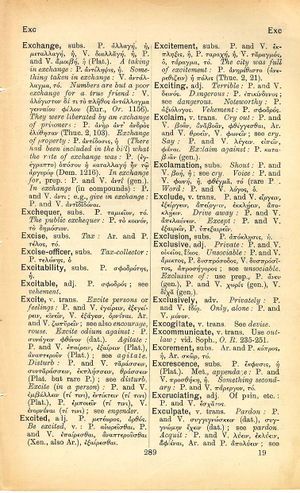exclusive: Difference between revisions
From LSJ
Εὐκαταφρόνητός ἐστι σιγηρὸς τρόπος → A way of life disposed to silence is contemptible → Taciturna facile ingenia contemni solent → Gemein ist ein Charakter, über den man schweigt
(2) |
m (Woodhouse1 replacement) |
||
| Line 1: | Line 1: | ||
{{Woodhouse1 | {{Woodhouse1 | ||
|Text=[[File:woodhouse_289.jpg|thumb|link={{filepath:woodhouse_289.jpg}}]] | |Text=[[File:woodhouse_289.jpg|thumb|link={{filepath:woodhouse_289.jpg}}]] | ||
===adjective=== | |||
[[private]]: [[prose|P.]] and [[verse|V.]] [[οἰκεῖος]], [[ἴδιος]]. | |||
[[unsociable]]: [[prose|P.]] and [[verse|V.]] [[ἄμικτος]], [[prose|P.]] [[δυσπρόσοδος]], [[verse|V.]] [[δυσπρόσιτος]], [[ἀπροσήγορος]]; see [[unsociable]]. | |||
[[exclusive of]]: use prep., [[prose|P.]] [[ἄνευ]] (gen.), [[prose|P.]] and [[verse|V.]] [[χωρίς]] (gen.), [[verse|V.]] [[δίχα]] (gen.). | |||
}} | }} | ||
{{LaEn | {{LaEn | ||
|lnetxt=exclusive ADV :: exclusively | |lnetxt=exclusive ADV :: exclusively | ||
}} | }} | ||
Revision as of 08:55, 20 May 2020
English > Greek (Woodhouse)
adjective
private: P. and V. οἰκεῖος, ἴδιος.
unsociable: P. and V. ἄμικτος, P. δυσπρόσοδος, V. δυσπρόσιτος, ἀπροσήγορος; see unsociable.
exclusive of: use prep., P. ἄνευ (gen.), P. and V. χωρίς (gen.), V. δίχα (gen.).
Latin > English
exclusive ADV :: exclusively

